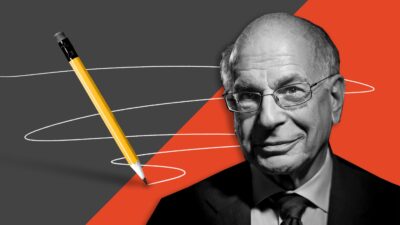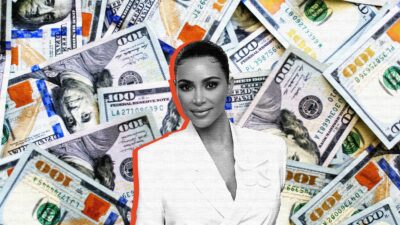Sandra Peter and Kai Riemer

Finfluencers and TikTok financial advice on The Future, This Week
This week: Finfluencers – more and more young people get their financial advice on TikTok and other social media platforms. Also, robot vacuums and pet poop AI and the epic #Epic #Apple battle comes to a temporary end.
Sandra Peter (Sydney Business Insights) and Kai Riemer (Digital Futures Research Group) meet once a week to put their own spin on news that is impacting the future of business in The Future, This Week.
The stories this week
10:27 – TikTok finfluencers offer financial advice
Other stories we bring up
The epic #Epic #Apple battle starts off previously on The Future, This Week
Epic’s win over Apple is actually an Apple victory
Robot vacuums are learning to avoid dog poop and concern privacy experts
Spying robot vacuums previously on The Future, This Week
Swearing robot vacuums previously on The Future, This Week
A Roomba that swears when it bumps into stuff
Our new podcast series, The Unlearn Project and our discussion on robots coming to make life harder on The Future, This Week
GameStop being reviewed by the Securities and Exchange Commission
TikTok finfluencers under ASIC scrutiny
Gen Z gets career advice on TikTok in the WSJ
Gen Z learning personal finance from TikTok and YouTube survey
Follow the show on Apple Podcasts, Spotify, Overcast, Google Podcasts, Pocket Casts or wherever you get your podcasts. You can follow Sydney Business Insights on Flipboard, LinkedIn, Twitter and WeChat to keep updated with our latest insights.
Send us your news ideas to sbi@sydney.edu.au.
Music by Cinephonix.
Dr Sandra Peter is the Director of Sydney Executive Plus at the University of Sydney Business School. Her research and practice focuses on engaging with the future in productive ways, and the impact of emerging technologies on business and society.
Kai Riemer is Professor of Information Technology and Organisation, and Director of Sydney Executive Plus at the University of Sydney Business School. Kai's research interest is in Disruptive Technologies, Enterprise Social Media, Virtual Work, Collaborative Technologies and the Philosophy of Technology.
Share
We believe in open and honest access to knowledge. We use a Creative Commons Attribution NoDerivatives licence for our articles and podcasts, so you can republish them for free, online or in print.
Transcript
Disclaimer We'd like to advise that the following program may contain real news, occasional philosophy and ideas that may offend some listeners.
Sandra So what are we talking about this week?
Kai The epic #Epic #Apple battle has come to a least interim conclusion.
Sandra I'd like to say an epic finale, but it is a conclusion that will be most likely appealed. And that we actually don't have that much to say about because back in September of last year, September 2020, we did this entire episode, this #Fortnite: the epic #Epic #Apple battle, where we kind of unpacked what it would come down to, and we basically said it would come down to how the judge defines the market.
Kai This is how it played out in the end, while some news outlets reported that Epic had won an important, at least part of the battle, on closer inspection, this is really a resounding victory for Apple because Apple was found not to have a monopoly, which is what Epic wanted to prove.
Sandra The important deciding factor was, as you said, figuring out what the market is and whether or not Apple had the monopoly in that market. And the judge basically, in the end came down neither on the side of Apple nor on the side of Epic, but took a position that very much favours Apple in the end. And basically, the judge disagreed with Apple that the market is digital gaming in general. So Apple had argued that the market should be not just Apple and Android, but also consoles and PCs, and hence, it didn't have a monopoly.
Kai So basically, anywhere that people could play Fortnite or access Epic's products.
Sandra And then Epic have argued that, 'well, there's basically a mobile phone market. And in there, there's only iOS and Android'. And on the iOS, there's basically just Apple, hence, Apple had the monopoly in the iOS distribution market.
Kai So Epic was saying that the relevant market should just be the Apple App Store. And the judge did not go along with this.
Sandra But the judge ruled that the relevant market was the mobile game market. So games on mobile devices as a distinct market from like the general digital games market that would include consoles, and PCs, but also as a distinct market from just the iOS market. And in saying that the digital games, the mobile games market, Apple would not have a monopoly position, even though it has a little over a 50% of the market, there was not sufficient evidence that it has a monopoly position.
Kai And Recode actually put it quite nicely and bluntly, by saying, "it's hard to prove that Apple is a monopoly when the judges definition of the market also includes its competitors," meaning there is also Android and Google, and consumers do have a choice of where they get their apps, where they access Epic's products on a mobile device, and hence, it's not a monopoly.
Sandra So overall, a win for Apple. But one small win for Epic, who will no doubt appeal this ruling so we will keep an eye on this. But one small win for Epic for now is...
Kai It's just a change that Apple had already made a few weeks ago, which is to allow developers to point to alternative ways of paying for their products outside of the App Store. So while consumers will still be able to pay for in-app purchases within an app, within the app store developers can also include a link now and point users to a website where they can make payments. So a very small concession, something that Apple pretty much anticipated and had already implemented.
Sandra
In other news, we do have to mention the Roomba story, don't we?
Kai Yeah, absolutely. This is some real innovation.
Sandra Image recognition, artificial intelligence, robotics all coming together in your very own Roomba, the self-driving vacuum cleaner? What are we calling it?
Kai Self-driving vacuum cleaner.
Sandra My parents have one, full disclosure.
Kai And this is the Washington Post reporting. That's how important this news is.
Sandra I think we're both trying away here from being the one to share it.
Kai Well, this battery of new technologies that have found their way into this cleaning robots and the company calls the Roomba, "the thoughtful, collaborative cleaning partner", is there to basically avoid shit.
Sandra That is pet poop, which seems to be causing a lot of problems.
Kai Yeah, and shame this is a podcast. No, we wouldn't show it to you, but we want to appeal to your imagination to think about what happens when a Roomba encounters pet faeces, and rather than just cleaning it up smears it all over the house. So this important problem that pet owners encounter, which you can only imagine the clean-up afterwards is a kind of a bit shit, is now being solved via image recognition, locating the problem, photographing it, sending it to its owners smartphone, and then basically cordoning off the area virtually and avoiding touching the object in question.
Sandra And your question rightly could be at this point, why, why the Roomba? Why talk about the Roomba? And there's a number of reasons. First, just the sheer amount of machine learning, image recognition, and other technology that goes into this small device. I mean, it is a self-driving device that avoids things around your house. There's also the privacy aspect. We actually covered this Roomba back in 2017 in one of our first podcasts in an episode around spying vacuums, that was looking at the fact that the Roomba as it goes around cleaning your house actually collects a lot of data about the layout of your home, which then can be sold to other companies, whether that's real estate providers or people looking to provide other services for your house. And that it's quite scary because no one reads the, I'm fairly sure my parents didn't read the privacy agreements for the Roomba, and the ways in which that data could be then used by third-parties to sell you anything from a different house, a real estate agent who could tell you how you could be better served by a different property, to Amazon selling you air conditioning, to the other companies just telling you how to spend money on better lighting or other devices that will optimise the layout of your home.
Kai And this device not only maps your home's layout now it also comes now with sensors and the camera to basically look around the floor to you know, watch out for shit. The company says that the algorithm will not capture anything that looks like a face, be it in a photograph or you know actual human faces. And there's all kinds of security in place and safety and privacy. But it is nonetheless one more device that runs around your home with a camera. But the interesting aspect for me was also how they actually trained the device. So they built more than 100 props that look like turds, basically, to train the computer vision system. And it was also then deployed to the Roomba employees to test it in the field to constantly update the self-learning algorithm to make it better at you know, recognising shit in all its glory.
Sandra There's two more links that would be remiss if we didn't make now because, you know, a Roomba encountering these things and not being able to distinguish them and then dragging that shit all around your house really speaks to the topic of our new series to The Unlearn Project, how automation is coming to make our lives just a little bit more shit. It's actually the new episode out in our other series, looking at how automation, we're looking at cognitive work, you know, everything from tech workers, to bankers, lawyers, and so on. But looking at how automation really leads to more stressful work, higher intensity work. And so robots are just coming to make your life a little bit harder. The Roomba reminds me of that. So you know, head over to our other channel The Unlearn Project, and find out how AI and automation can make work a little bit more stressful and hear from pilots and lawyers and rideshare drivers and Kickstarters and all that. But it also reminds me of one of our favourite episodes when we spoke about the swearing Roomba. Remember that guy Michael Reeves?
Kai Who trained the Roomba to basically swear whenever it hits an obstacle. Can you imagine what that Roomba would say when it rides over a pile of turd?
Sandra I can because I actually, I think we have it encountering something similar. There was audio to that effect.
AUDIO SWEARING ROOMBA.
Sandra But I think that's enough with that.
Kai We found an interesting story in the Financial Times that surprised us which has to do with the fact that many people in genset getting their financial advice on TikTok
Sandra Finfluencer, FinTok and getting your investment advice and your finances sorted on TikTok.
Kai Let's do this.
Intro From The University of Sydney Business School, this is Sydney Business Insights, an initiative that explores the future of business. And you're listening to The Future This Week where Sandra Peter and Kai Riemer sit down every week to rethink and unlearn trends in technology and business. They discuss the news of the week, question the obvious, and explore the weird and the wonderful.
Sandra So our story today comes from the Financial Times. It's titled "TikTok offers investors both sense and nonsense". And it's a fairly long read that goes into the interesting world of young people getting their financial advice from places like YouTube, but even more significantly on TikTok.
Kai And it's probably worth reminding people what TikTok is, so TikTok is a social media platform that revolves around the sharing of short user generated videos of between 15 seconds and three minutes in length. And the platform just recently increased the limit from 60 seconds to three minutes, but most videos are still really very short.
Sandra And we've had a couple of episodes unpacking TikTok and what happens on TikTok, we'll include all the links in the shownotes. But suffice to say for now, that TikTok, as you've said, is a social media company. It's owned by China's ByteDance. And it features very, very short videos, which are presented to users not based on their social graph, but rather on what the algorithm deems as engaging. And there is everything there from lip synching videos to challenges to memes politics. When we discussed the election, we discussed how a surprising number of young people get their political news from TikTok. But it turns out, there's a lot more than that happening, hence Finfluencers.
Kai So the Financial Times reports that TikTok plays a big role in how young people and the data is from the UK here, have taken up investing especially during COVID when people were stuck in the house and wanted new things to do, saying that about 1/6 of British youth between 18 and 23 years old, have started investing for the first time, half of those invest in crypto assets.
Sandra More than half of them draw on TikTok for that advice. And as you said, the article is from the Financial Times and it talks about the UK Gen Z, Gen Zedders, but we’ll include in the shownotes a link to an article in the Wall Street Journal that looks at Gen Z getting their career advice on Tick Tock and reflect on American audiences as well, and we'll also include a link from the Sydney Morning Herald looking at TikTok influencers and the scrutiny that they draw here in Australia.
Kai And we also found another study commissioned by the website GOBankingRates, which questioned 1000 Americans in the age between 18 and 24, which found that nearly 40% of those said that they were getting financial advice from social media platforms such as TikTok. So not just a UK phenomenon, but something that exists more broadly.
Sandra So first, let's unpack what Finfluencers are and what kinds there are. And then let's have a bit of a look at the, 'so what', what happens on this platform, what the implications are for everything from kind of actual advice to regulation to trust to how we think about education. Because this world of Finfluencer's actually quite varied, right, there's good, there's bad, there's the beautiful and the ugly.
Kai There's those who you know, discovered saving and budgeting who come with prudent advice for how to set aside some money to build a nest egg. They explain compound interest and how much you can earn for later in life or for that down payment for a house or for a car by being savvy with your finances. And then there's the other side of that spectrum as well.
Sandra On the other side of the spectrum, there's a lot of people promoting more questionable products and initiatives or engaging in 'pump and dump', trying to get people to buy certain stocks so that they can then unload them at the higher prices, or really just promoting various types of scams.
Kai And especially in crypto with so called 'altcoins', alternative coins that don't have a lot of liquidity. If you can convince a few 1000 people to buy the coin and you bought it at a low price yourself, you can actually make quite a bit of money. So there's evidence that a fair bit of that is going on among Finfluencers.
Sandra So across the board, a fairly mixed bag. So why are we talking about this, really?. And first of all, you know, reminding people that when we're talking 30-40%, that's a significant number of young people getting their financial advice from platforms like TikTok, or indeed YouTube in a way that they never did before. So it's worth unpacking what's actually going on.
Kai So, there's the trust aspect. Many of the people in this generation say that they do not trust traditional investment bankers, people in suits were described as 'crooks' in the Financial Times article. Whereas getting advice from peers on platforms like TikTok carries way more trust and is therefore more readily taken on board.
Sandra And it's worth reminding here that some of these people are actually sponsored by traditional financial institutions, who basically pay them to promote certain services or products. And that should be disclosed but in many cases isn't.
Kai And that ranges across the board from companies like MasterCard, which was mentioned over legitimate apps for social investing, to the more questionable products and financial schemes that might not be regulated in the countries where it's then being advertised on TikTok.
Sandra But unscrupulous practices aside, there is a legitimate space here for investment education that is also entertaining, albeit very short form, there, likely are many concepts that you can't really explain in a 15 second to three minute video. But nonetheless, there is a significant educational component to this.
Kai The article makes the point that many young people might not get the kind of financial literacy in school or indeed at home. So, people who, on the one hand share their own learning, share their own investment journey, their own experiences on TikTok might actually be a legitimate way to learn yourself into a prudent investment strategy and to start saving early and engage with investments early in life. The point is also made that it can bring along non-traditional groups, minorities, for example, or those who are interested in social investing. So there are good sides to engaging people on TikTok around financial products.
Sandra But it also points to this fracturing of the understanding of where people get their financial information from. And this is both in kind of a family setting where parents of teenagers or young people who are just setting out on their investment journeys are really completely unaware that much of this financial education occurs on platforms like TikTok, or YouTube and might not be able to advise people on you know, prudent practices like you would go about in just the traditional ways in which we get our financial advice. Similarly, if you're looking at high school education, or even higher education, very few people consider a platform like TikTok when thinking about how people develop their understanding of financial markets or saving decisions investment decisions in the long term.
Kai But it also comes with the inherent challenge that it is not easy to distinguish between the good advice and the bad advice on TikTok if you don't have some kind of financial literacy already. So in this mix of all kinds of advice, it's not easy for young people to make those distinctions. And the danger is also that many of those young people have now been introduced to the share market and the crypto market in times during COVID, when the direction of those investments was mostly upwards. So many people have a positive experience making lots of money very quickly with all coins and crypto and even with shares in the tech sector in the US, which after this steep dive at the beginning of the pandemic have continuously gone up. So extrapolating from this past year for many might not lead to prudent investment when the direction reverses and the markets go into more choppy waters.
Sandra And here is where we have to point out the regulation angle. In Australia as well as in the UK or in the US, and any of the markets that these articles refer to, there is significant financial services regulation. In Australia, one needs to hold in Australia Financial Services Licence and therefore agree to comply with requirements to act honestly, efficiently and fairly towards investors and those they give out advice to. And so far none of these influencers fall under the requirements to have an Australian Financial Services licence. So there can be people who just do not have the training or the ability to provide good advice. There is the chance of them misleading audiences in the information that they provide. And then there's also the opportunity for manipulating markets, which we've seen not only on platforms like TikTok and YouTube, but we've also seen with the GameStop saga of earlier this year back in March 21, when people on a Reddit forum on a subreddit called wallstreetbets, which where a group of traders actually pumped up the stock of the video game retailer which went up 10s of percent’s with no apparent reason whatsoever. And similarly, in that situation, and in that case, the Securities and Exchange Commission was unable to really legally prosecute the case given that financial services, licences and other regulation in the space does not yet have a way of accounting for these ad hoc forms of organising on platforms like TikTok, or in that case, Reddit.
Kai We'll include the link in the shownotes. And since this type of investing is more and more a social phenomenon on Reddit, much like on TikTok regulators are now faced with a new phenomenon that is very hard to regulate, and very hard to come to grips with. And so again, this points to the role of platforms. Are platforms just containers in which behaviour happens, and they are not responsible, or do they have the obligation to moderate? How will regulators distinguish between the platform and the influencers? Will there be distinctions between, you know, just people sharing their experiences, those that are being sponsored, those that are already celebrities. So it remains to be seen how regulators who are now becoming increasingly aware of this phenomenon, will deal with the influence that Finfluencers wield, especially in smaller markets like that of some of the crypto coins.
Sandra And so a number of reasons there for you to keep an eye on what's happening with Finfluencers, and also a good gateway into the world of new ways of advice and entertainment/education that happens on platforms like TikTok. It's not just a world of financial advice, but there's, you know, HR and job seeking advice there. There are coding lessons, and TikTok stars who teach coding in, you know, 15 second to three minute videos, and we'll include all of those links in the shownotes. But that's all we have time for today. And don't forget to subscribe to The Unlearn Project
Kai The Unlearn Project!
Sandra
And find out why automation not just the Roomba might make your world just a little bit...
Kai Harder.
Sandra Worse. Thanks for listening.
Kai Thanks for listening.
Outro This was The Future, This Week, an initiative of The University of Sydney Business School. Sandra Peter is the Director of Sydney Business Insights and Kai Riemer is professor of Information Technology and Organisation. Connect with us on LinkedIn, Twitter and Flipboard and subscribe, like or leave us a rating wherever you get your podcasts. If you have any weird and wonderful topics for us to discuss, send them to sbi@sydney.edu.au.
Close transcript







